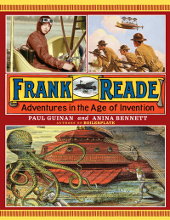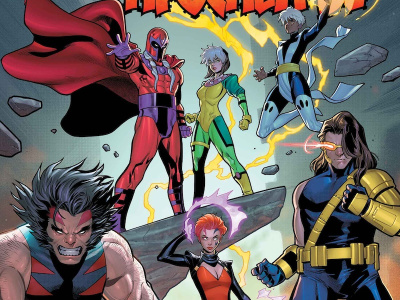 Confessions of a Comic Book Guy is a weekly column by Steve Bennett of Super-Fly Comics and Games in Yellow Springs, Ohio. This week, Bennett looks at Marvelman and Frank Reade.
Confessions of a Comic Book Guy is a weekly column by Steve Bennett of Super-Fly Comics and Games in Yellow Springs, Ohio. This week, Bennett looks at Marvelman and Frank Reade.I need to thank Dave Brzeski for taking the time to comment on last week's column (see "Dave Brzeski of The House On The Borderland on Captain Marvel"). In case you missed it, in it I said the most ironic thing about Captain Marvel now going by "Shazam" is that Marvel finally had the name "Captain Marvel" all to itself. Dave countered that even more ironic was the fact Marvel had the rights to Marvelman, a character created to take the place of Captain Marvel when he was sidelined by the DC/Fawcett lawsuit. And now DC actually owns the character they once sued out of existence.
I'll confess, that's pretty darn ironic. And while it's not really a contest but, for me, what's really ironic about the whole situation is that except for their conjoined history and some surface similarities, Marvelman really wasn't all that much like Captain Marvel. Okay, sure, both characters were constantly being annoyed by be speckled pharmacists with phenomenally bad teeth (Marvelman's Dr. Gazunga was clearly somehow related to Captain Marvel's Dr. Sirvana). But in a lot of ways he was the 1950's "science hero" version of Captain Marvel that never happened I was speculating about.
Mostly likely to take advantage of the growing interest in science fiction, Marvelman creator Mick Anglo ditched the whole "one magic word" business and gave the character an atomic age origin. And for supposedly practical reasons (i.e., he thought it was a pain in the butt to draw), Anglo eliminated Captain Marvel's "cloak" (as he called it). Which had the unintended side effect of making Marvelman seem more modern and streamlined by comparison.
But the major way in which Captain Marvel and Marvelman differed was in their stories. Captain Marvel's were fantasies, essentially fairy tales, but Marvelman's were like more like dreams, something Alan Moore picked up on decades later when he revived him in Warrior. Let's look at their origins. Over the years an intricate mythology grew up around every aspect of Captain Marvel's origin, from the old wizard to the Rocket of Eternity to the gods (and Biblical king) who gave him his powers. But in comparison Marvelman's was eerily dreamlike. A mysterious figure identified only as "Astro-physicist Guntag Barghelt" appears before Billy Batson stand-in Mickey Moran and bestows on him "Kimota," the "key harmonic of the universe." Guntag then promptly disappeared and was mostly never spoken of again.
In 2010 Marvel published some of this material in the Marvelman's Family Finest miniseries. Of course ultimately what they want is to reprint the Alan Moore/Neil Gaiman material, but frankly that material probably has a limited appeal, at least to a large mainstream audience. Perhaps I'm delusional but I still think the still elegantly simple idea of a kid who could turn into an adult superhero has a lot of possibilities, if not in the direct sales market then elsewhere (animation, etc.). Which isn't to say I wouldn't want to see someone like Jim Starlin take a crack at the concept.
If I sometimes seem obsessed with the past it's because sometimes I am, partially because so much of the new stuff I love isn't so much "new" as contemporary versions of older creations. Take for example that heroic fiction stable the two-fisted boy super scientist; the back pages of Golden Age comic books once were chockfull of boy inventors. And while the concept isn't as popular as it once it currently lives on in animation form in two wildly different takes on the trope--The Venture Brothers and Phineas & Ferb. For years I always assumed it dated back to the boys adventure series Tom Swift but as usual I couldn't have been more wrong.
It began, more or less, with Frank Reade Sr. and Jr., turn of the century dime novel heroes who created fantastic vehicles and steam powered robots to explore and protect US interests around the world. I've been fascinated with the character for a long time but never thought anyone else cared about him until I learned about Paul Guinana and Anina Bennett's book Frank Reade: Adventures In The Age Of Invention. I would have been (relatively) easy to just to tell the publishing history of the characters but instead the authors have crafted something that looks for all the world like a high school history text from an alternative universe.
It's a metafictional mash-up of their own fictional take on the characters as well as an examination of how their adventures reflected American racial and political attitudes of the time As you'd expect from the authors of the book Boilerplate: History's Mechanical Marvel, this is one handsome volume, meticulously detailed and designed, a treasure trove of black and white color illustrations, some of which place the characters and their vehicles in historical settings. As to why you should care, besides being a wonderful book the authors made the convincing case that the Reades were the inspiration behind Doc Savage, Buckaroo Banzai and Thunderbirds. It's well worth your time to seek it out.
The opinions expressed in this column are solely those of the writer, and do not necessarily reflect the views of the editorial staff of ICv2.com.








